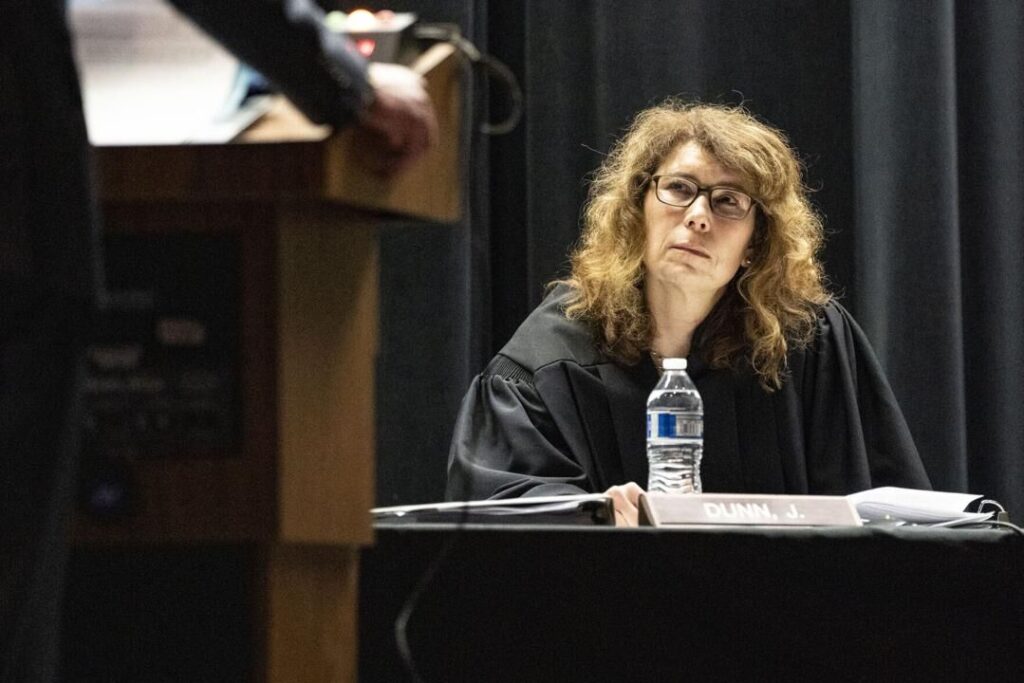Federal judge dismisses claims against DPS over disabled student who fell out of window
A federal judge concluded on Tuesday that a cognitively disabled student failed to allege Denver Public Schools and one of its employees violated his constitutional rights by briefly leaving him unattended in a classroom, only for him to climb out of the window and fall two stories.
U.S. District Court Judge Charlotte N. Sweeney rejected the idea that the defendants created a danger for the injured student, identified as Master E.F.R. At most, she believed negligence was to blame for the boy’s accident.
“There is simply no indication at all that there was an obvious risk a student, whether disabled or not, would go out a window in a time period that appears to be 60-90 seconds,” Sweeney said at the end of the hearing.

Attorney David Gartenberg applauds for U.S. District Court Judge Charlotte N. Sweeney at a legal event in Denver on July 21, 2023.
E.F.R. and his mother, Teresita Rodriguez-Martinez, alleged he had significant intellectual and communication deficits, as documented in his individualized education program (IEP). Among other things, the IEP advised that E.F.R. “has a tendency to take off running” and “needs to be watched and monitored at all times.”
E.F.R. was a student at John F. Kennedy High School on Aug. 29, 2022 when Kindra Youngblood left him alone in a second-floor classroom. Documents of the subsequent investigation — which Sweeney did not consider because the plaintiffs failed to submit them properly to the court — elaborated that E.F.R. was refusing to leave the classroom. In response, Youngblood turned off the lights and walked out to demonstrate to E.F.R. that it was time to go home.
Youngblood peeked through the classroom doors and saw E.F.R. remaining in the room. At that point, three students approached her seeking help. After assisting the students over a period of approximately 90 seconds, Youngblood no longer saw E.F.R. in the classroom. He had squeezed himself through the angular opening of a classroom window and fell onto the ground.
E.F.R. was hospitalized for his injuries. He and his mother filed suit in Denver District Court alleging violations of his rights under state law, plus two claims implicating his constitutional right to due process. Under the latter claims, Youngblood and DPS “created or increased a danger to E.F.R.” and they failed to protect E.F.R. while he was in their custody.

FILE PHOTO: The Alfred A. Arraj federal courthouse in Denver
The defendants transferred the lawsuit to federal court due to the constitutional allegations. Attorney Robert P. Montgomery argued to Sweeney there was no clear constitutional violation that caused E.F.R.’s injuries.
“With respect to Ms. Youngblood, her actions as alleged in the complaint are closing a door and turning off a light. There’s no other intent ascribed to her,” he said. “There is no case law that says something like this is prohibited and violates the constitutional rights of any student or anybody else in a public school. I would venture to say if something like that could violate the constitutional rights of a student, we’re gonna have to rethink a whole lot of things in public education.”
Adam D. Parkes, the plaintiffs’ attorney, countered that E.F.R.’s severe disability “raises this issue to heinous.”
“What about the point that there’s never been another student who climbed out one of these windows?” asked Sweeney. She added that U.S. Supreme Court precedent required the defendants’ actions to be “conscience shocking,” and noted the plaintiffs had not alleged Youngblood intended for E.F.R. to be harmed.
As for any liability DPS itself may have, Sweeney repeatedly asked Parks to describe the policy or the custom of the school district that allegedly contributed to E.F.R.’s injuries. After he was unable to answer, Sweeney asked him to sit down and “come up with an argument that isn’t in your brief and really isn’t in your complaint.”
Ultimately, Sweeney dismissed the plaintiffs’ constitutional claims. She concluded Parkes made “zero effort” to argue DPS itself caused any constitutional violation. Further, there was “no case even remotely similar to this that would put (Youngblood) on notice that her conduct in leaving the room for 60-90 seconds and remaining in the hallway, to the extent she did — if that’s what she did — would create this sort of constitutional violation,” Sweeney said.
With no federal claims remaining, Sweeney declined to handle the plaintiffs’ state law claims.
The case is Master E.F.R. et al. v. Denver Public School District et al.











